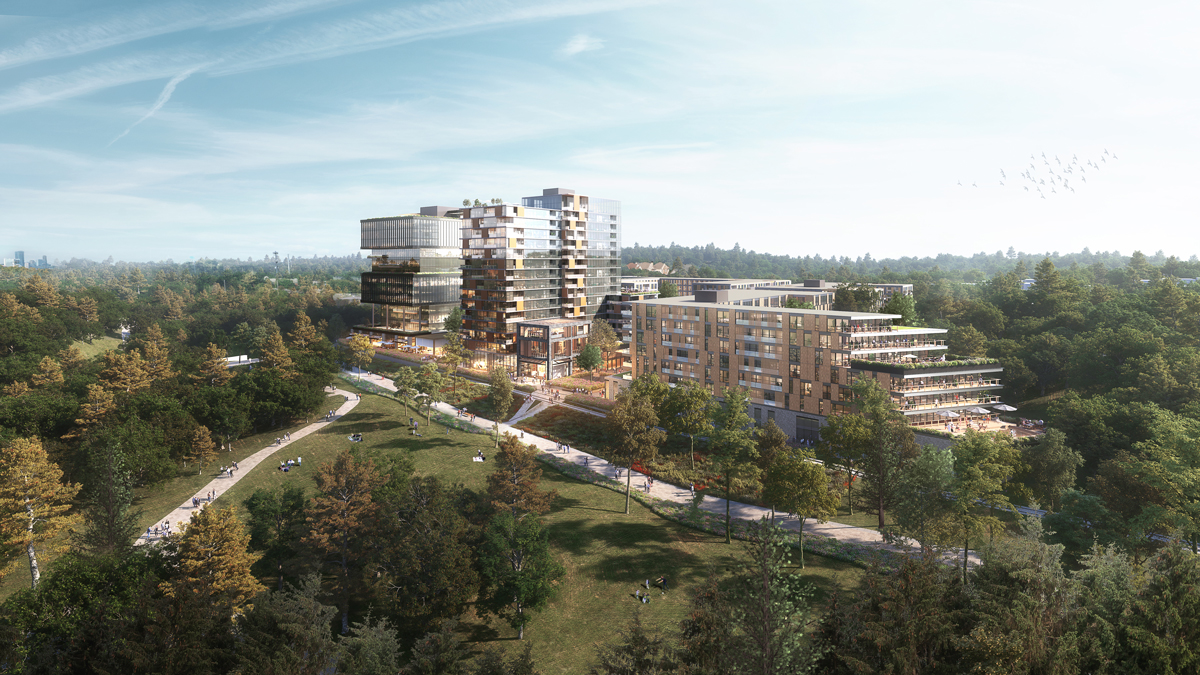
Rendering courtesy of Portman Holdings and Skidmore, Owings & Merrill
Yesterday a coal depot, today a small-business shopping center, tomorrow the hottest new property on the Beltline? That’s the plan for Amsterdam Walk, according to Atlanta developer Portman Holdings, which recently unveiled its mixed-use redevelopment proposal for the nine-acre site located off Monroe Avenue.
Here’s what we know so far about what’s in store for Amsterdam Walk.
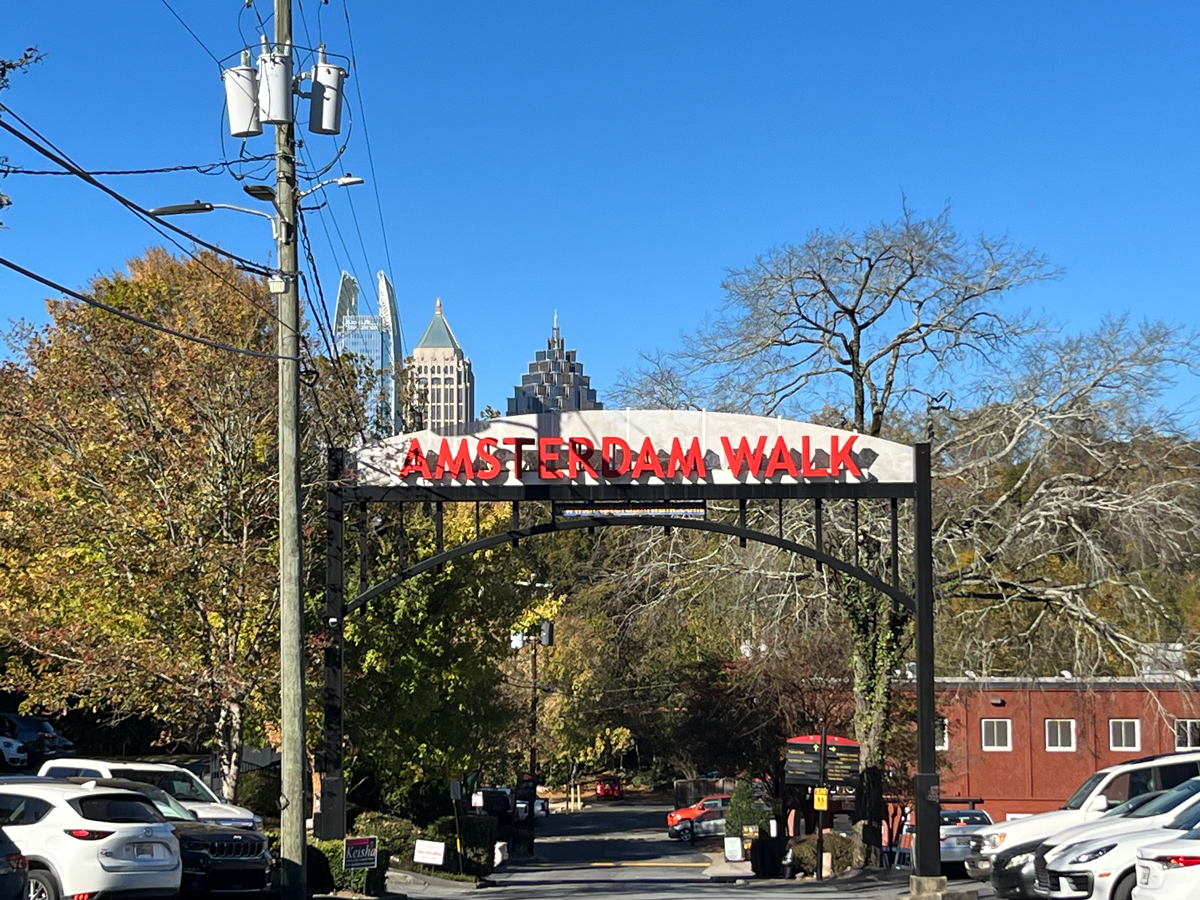
Photograph by Rachel Garbus
What is Amsterdam Walk?
Wedged between Monroe Drive and Piedmont Park, Amsterdam Walk is a quirky commercial area populated by about two-dozen small businesses. Those include a preschool and a doggie day-care, a Crossfit gym, a cafe, and a ballet school, to name a few. Red Light Cafe, one of Atlanta’s last independently owned music venues, has hosted live shows there since 1991.
“We love it here, it’s very eclectic,” says Harris Botnick, president of Worthmore Jewelers, one of Amsterdam Walk’s longest tenants. “It’s almost all local businesses.”
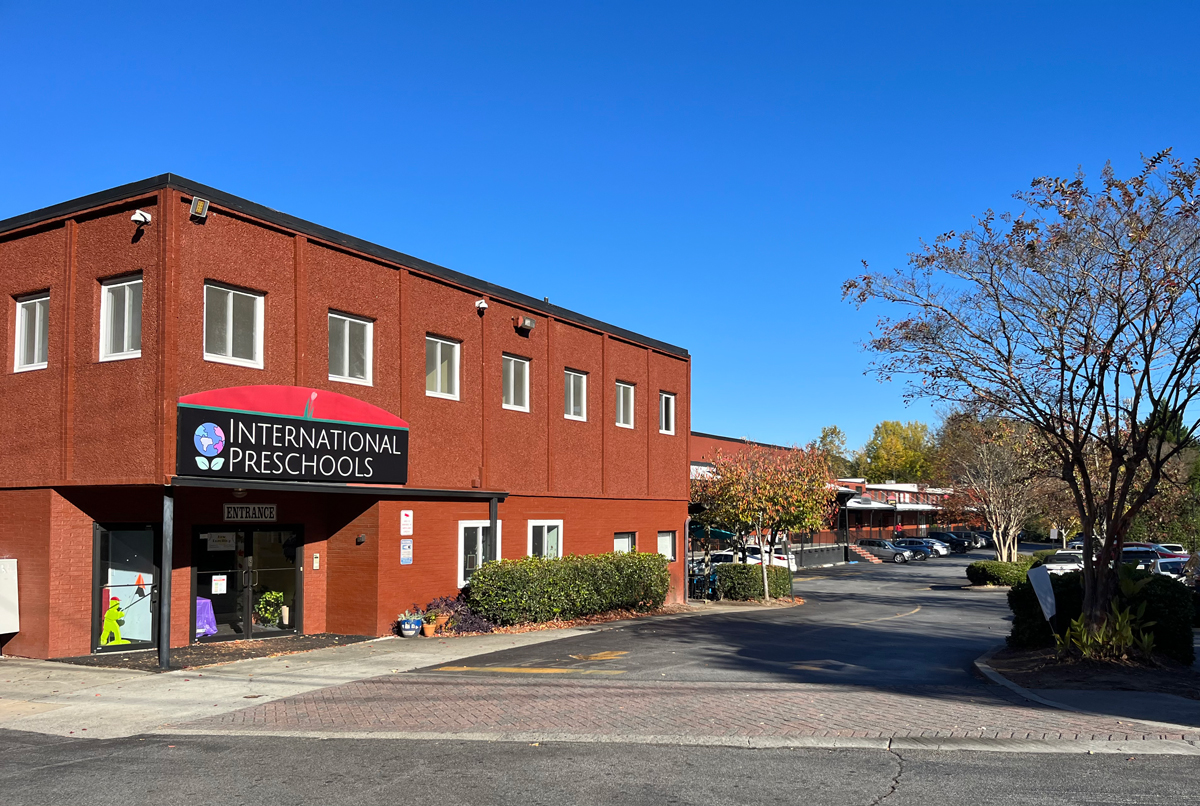
Photograph by Rachel Garbus
Worthmore and its neighbors operate out of retrofitted 19th-century warehouses originally built for the Campbell Coal Company, which once unloaded freight cars of coal off the adjacent railway line. The warehouses were later taken over by an appliance wholesaler, until that business caught fire in 1964. Most of the buildings then sat empty for decades. The Cove, a legendary Atlanta gay nightclub, operated just north of the existing property until 1994.
The area reopened as a retail business district in the nineties. The Amsterdam Walk name, dubbed for the side street that connects the complex to Monroe Drive, was christened in the early 2000s. Businesses there attract plenty of foot traffic, especially on the weekends, but two restaurants that once anchored the area have recently closed: Guac y Margys shuttered its location there in 2023, and Loca Luna, a popular spot for tapas and Latin dancing, lost its lease in 2022 after a shooting in the restaurant’s parking lot.
Why is it being redeveloped?
Developers have long eyed Amsterdam Walk for redevelopment. The BeltLine-front property connects to Piedmont Park and the Atlanta Botanical Garden and is located between two of the most in-demand neighborhoods in the city.
“There are so many amenities and features about the property that we just love,” says Mike Greene, senior vice president of development at Portman Holdings, who noted Amsterdam Walk’s strategic positioning between other popular spots on the BeltLine trail. “If you think about the BeltLine as a necklace of nodes, this [location] makes a lot of sense.”
As they’re currently situated, the buildings have their back turned to the park and the BeltLine, something Portman Holdings wants to invert in their overhaul. The developers—who are behind some of the biggest construction projects in Atlanta’s recent history, including the Krog junction district and an in-the-works development on Ponce—were also attracted to Amsterdam Walk’s commercial zoning, unusual in the city. Greene says surrounding communities are generally more receptive to development that doesn’t tear down homes: “We’re not going to ask neighborhoods to rezone a bunch of single-family home lots or something that was low-density before.” They have applied to rezone the property from commercial to mixed-use residential.
Portman is under contract to purchase the property from current owner Halpern Enterprises, which will remain an investment partner in the renovation. Halpern launched a “Reimagine Amsterdam Walk” project in 2021 to solicit community ideas for redevelopment, and later selected Portman to lead the overhaul.
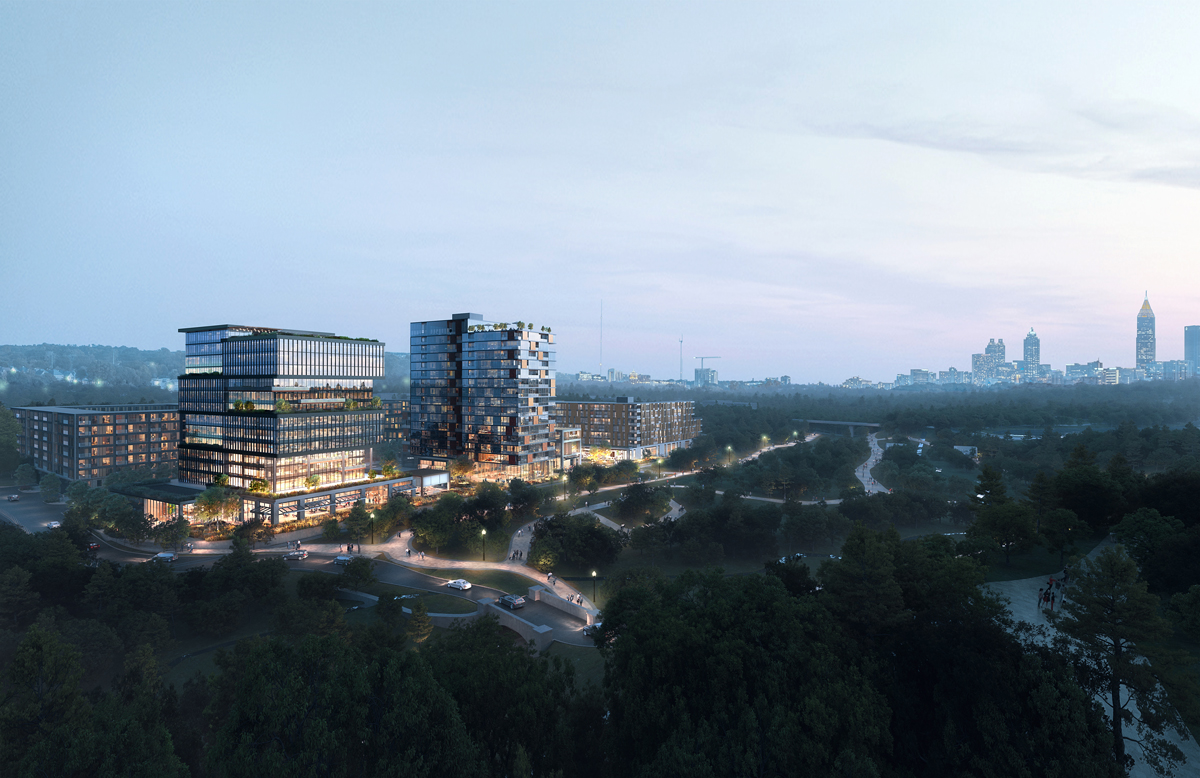
Rendering courtesy of Portman Holdings and Skidmore, Owings & Merrill
What will the redevelopment look like?
According to plans they’ve shared at neighborhood meetings, Portman plans to build 900 apartment units in four buildings, 330,000 square feet of office space, and 75,000 square feet of retail and dining. The plans include two high-rise towers, a 17-story apartment building, and a 13-story office building. To accommodate hundreds of new residents, they will build 1,400 parking spaces in a parking deck and underground garage.
The city of Atlanta requires BeltLine-adjacent construction to include some affordable housing, and Portman says about a fifth of apartments will be designated as affordable. According to city policy, that rate is set for tenants who make 80 percent or less than the metropolitan area’s median income; a one-bedroom at that “affordable” designation would cost $1,532. Portman will also designate 12.5 percent of commercial space as affordable for retailers who quality through a BeltLine program, with existing tenants eligible to apply first.
Renderings of the proposed redevelopment, created by SOM Architects, show a glossy, contemporary mixed-use complex overlooking the park, with restaurants and shops on the ground floor and access to the BeltLine via a public greenspace. Two entrances—the existing Amsterdam Avenue entrance and another on Evelyn Street through Piedmont Park—will connect the area to Monroe Drive.
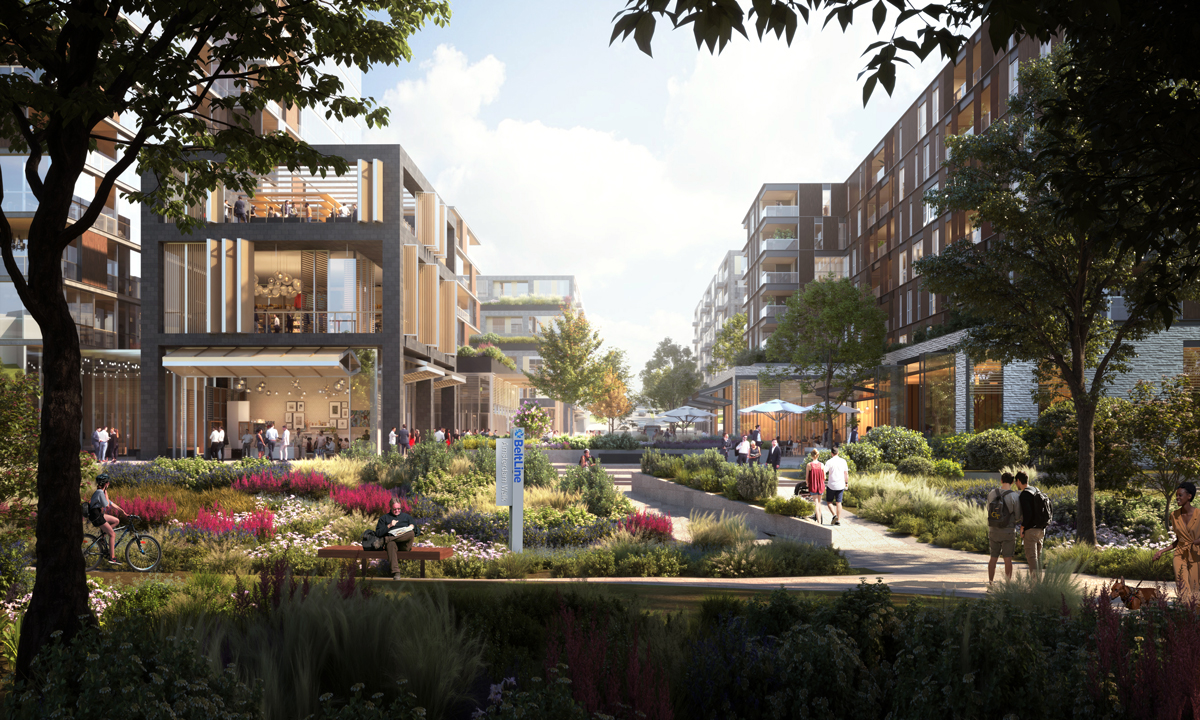
Rendering courtesy of Portman Holdings and Skidmore, Owings & Merrill
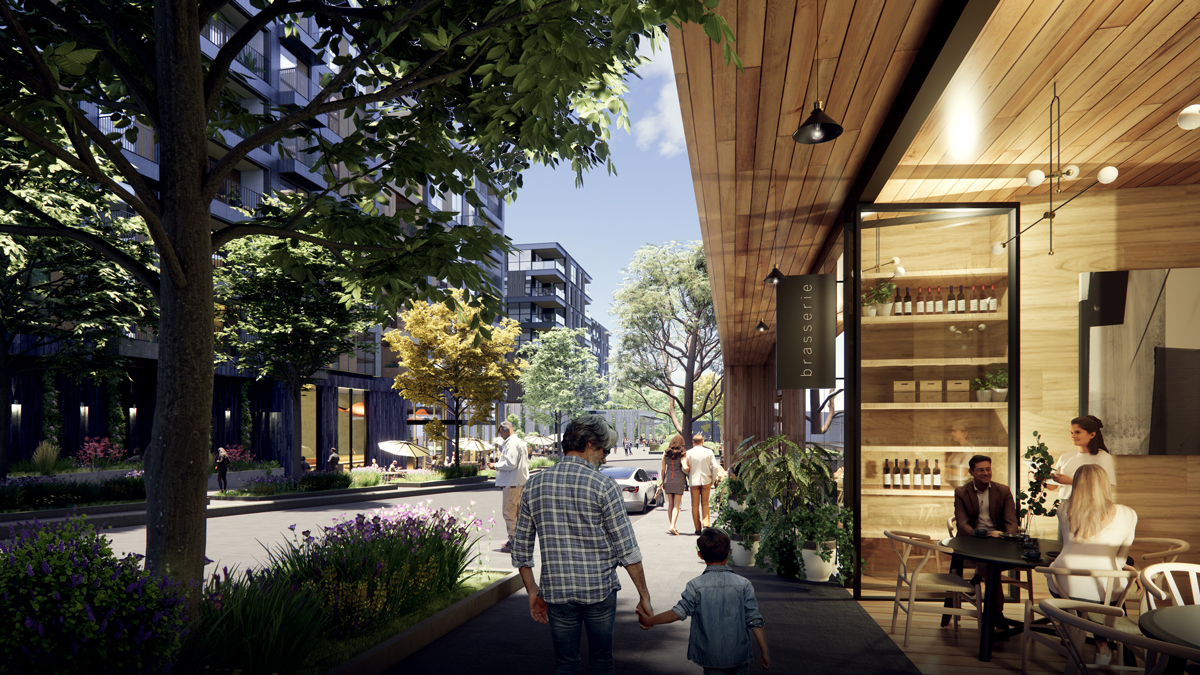
Rendering courtesy of Portman Holdings and Skidmore, Owings & Merrill
What are the concerns?
Neighborhood residents have expressed serious concerns about parking and traffic, especially since Monroe is already congested. An extensive traffic survey Portman commissioned as part of its Development Regional Impact (DRI) found that the new complex would increase daily traffic on Monroe Avenue by an average of nine percent.
According to Rough Draft Atlanta, a representative of Kimley Horn, which prepared the study for Portman, told residents at a September 23 meeting that the project “would not add significant traffic” to Monroe Drive, but Greene acknowledges that was likely an understatement. “I don’t know if that was an appropriate way to characterize that,” he says. “Traffic will be impacted as a result of the development, of course.” He adds that Portman would support a third-party traffic impact study if the neighborhood wanted one.
The city plans to overhaul Monroe Drive beginning in 2025, so the effect of a redeveloped Amsterdam Walk may be mitigated by signal improvements and turning lanes. But many nearby residents and current Amsterdam Walk tenants are skeptical that traffic won’t be significantly affected. “It’s hard to imagine 1,400 new parking spots wouldn’t impact Monroe,” says Botnick of Worthmore Jewelers. “We all drive on that street, and that’s pretty hard to imagine.”
Some neighborhood residents are also upset about their park views, which will be disrupted by the project’s taller buildings. Greene says they’ve pushed the high-rises as far away from single family homes as possible to limit how much they’ll disrupt views, and adds that Portman is open to negotiating the dimensions of the buildings: “If they don’t like the height so much, we could always make the building a little wider and bring it down.”
But Amsterdam Walk’s current commercial zoning has no height limits: If Portman walks away, Greene notes, another developer could step in and build even taller buildings. “You could lose your views today without a rezoning, and it could be a whole lot more than just a residential building,” he says. “It’s not going to stay the way it is today forever.”
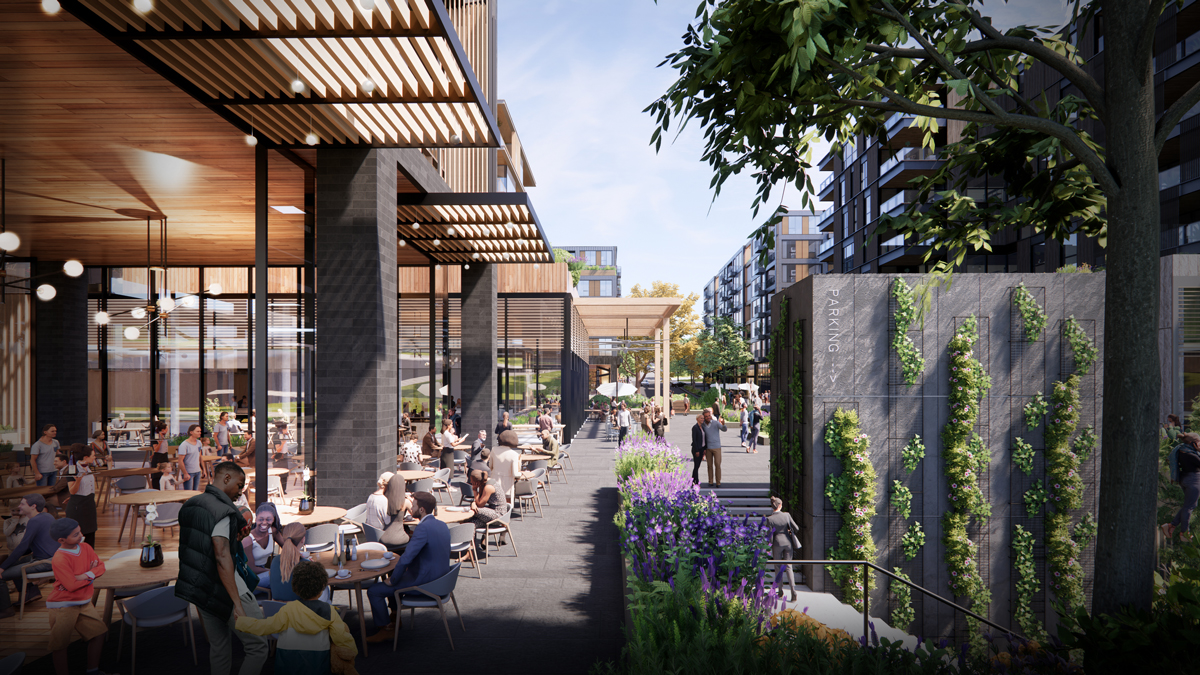
Rendering courtesy of Portman Holdings and Skidmore, Owings & Merrill
When will it happen?
If the Amsterdam Walk redevelopment moves ahead as planned, construction could begin as soon as two years from now, but the project wouldn’t be completed until at least 2028. Portman Holdings filed a preliminary rezoning application in October and will continue to hold community meetings as the plan progresses.
Asked whether the company would back out if community feedback points that way, Greene says it would depend on the nature of the objections and whether they were made by official civic associations. Portman made that commitment regarding its redevelopment on Ponce de Leon, but Greene says that Halpern Enterprise’s interest in renovating Amsterdam Walk means an overhaul is inevitable, even without Portman. “If they shoot us down, I don’t know what the next alternative is for them,” he says. “I like to think we’re pretty reasonable people to negotiate with to try to find the right solution.”
According to Botnick, Halpern has told its tenants they will have three to four years before it’s time to go, promising leaseholders a one-year notice. Worthmore would be sad to go, Botnick says: “We’ve been there thirty years—this was our first location.”
But the jewelry business has a second store in Decatur, and Botnick says they’re already scouting possible new locations as they as they await more news on the future of Amsterdam Walk. Diamonds may be forever, after all, but real estate rarely is.













